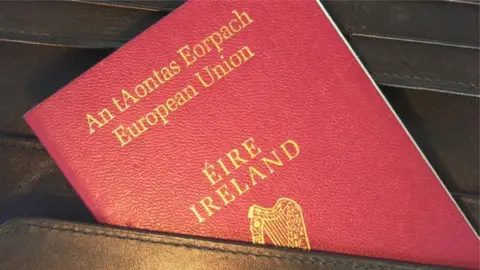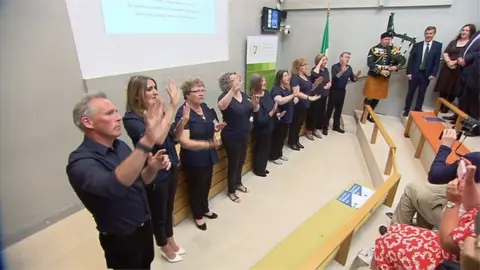Call to issue copies of national anthem with Irish passports
 BBC
BBCA copy of Ireland's national anthem should be issued with all future passports, an Irish parliamentary committee has recommended.
Amhrán na bhFiann/The Soldier's Song "threads through the hearts of Irish people" and should be protected and cherished, an Irish senator said.
The committee stopped short of recommending legislative protections including penalties for its misuse.
Members instead called for protocols offering guidance on correct usage.
 RTÉ
RTÉThe first ever public performance of the anthem in Irish sign language was also performed at Leinster House - the seat of the government - in Dublin on Tuesday in celebration of the committee's report.
On 1 January 2013, the anthem fell out of copyright protection. Fianna Fáil Senator Mark Daly called for it to be protected.
The report follows a public consultation. The committee recommended:
- Every primary and secondary school should be provided with the various versions of the anthem to assist in teaching and learning;
- On the eve of St Patrick's Day, school children should be encouraged to hold events where the various versions of the anthem could be performed. It is envisaged that the annual events could also include a celebration of the national flag and the anthems and flags of children of different backgrounds;
- Irish citizens at home and abroad, as well as new citizens of Ireland, should be encouraged to become acquainted with the anthem to add to a sense of national pride and belonging;
- As the musical notation of the anthem is included in the Irish passport, a copy of the anthem and the protocols for its use should be issued with all Irish passports.
Peadar Kearney wrote the lyrics for The Soldier's Song in late 1909/early 1910 to a melody composed by Patrick Heeney.
Liam O'Rinn translated the song into Amhrán na bhFiann and the Irish version was first published in 1923.
Senator Daly said introducing law around the anthem could have been "counterproductive".
"You could end up in situations where people would start burning the national flag outside Leinster House to get arrested and bring attention to their cause," he said.
"The key concerns were the issue of the anthem being used in advertising - we have had cases where it was used to advertise food products. Now companies will have to write to the Department of Finance to get permission to use it."
The central concern is making everyone feel included in a modern and multi-cultural Ireland", he said.
"You'll hardly hear the anthem unless you're from Kerry and in Croke Park once a year," he said.
"The idea of singing the anthem on St Patrick's Day Eve is to celebrate it and to make everyone feel included - to give children from Poland, Lithuania, France or Britain, a sense of what it means to be Irish.
"There is a deaf community of 50,000 people in Ireland and they did not have a sign language version in Irish like this before."
Committee chair Senator Paul Coghlan said: "We know it as our national song and one that is very precious to us. Like all precious things, it is worthy of protection and care,"
"I believe that the recommendations set out in this report give expression to the absolute pride we all have in our National Anthem."
He said he hoped the recommendations would be taken on board by the Irish government and called for the report to be debated in Seanad Éireann.
